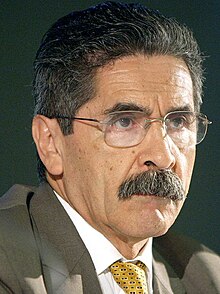Olívio Dutra
| Olívio Dutra | |
|---|---|
 |
|
| Minister of Cities | |
|
In office 1 January 2003 – 20 July 2005 |
|
| President | Luiz Inácio Lula da Silva |
| Preceded by | Office created |
| Succeeded by | Márcio Fortes de Almeida |
| Governor of Rio Grande do Sul | |
|
In office 1 January 1999 – 1 January 2003 |
|
| Lieutenant | Miguel Rossetto |
| Preceded by | Antônio Britto |
| Succeeded by | Germano Rigotto |
| Mayor of Porto Alegre | |
|
In office 1 January 1989 – 1 January 1993 |
|
| Preceded by | Alceu Collares |
| Succeeded by | Tarso Genro |
| Personal details | |
| Born |
10 June 1941 Bossoroca, Rio Grande do Sul |
| Nationality | Brazilian |
| Political party | PT (1980–present) |
| Spouse(s) | Judite Dutra |
| Occupation | Administrator, politician |
| Profession | Linguist |
| Religion | Roman Catholicism |
Olívio de Oliveira Dutra (born 10 June 1941 in Bossoroca, Rio Grande do Sul) is a Brazilian politician. He is a founding member of the Workers' Party.
Dutra graduated in Grammar school and became an employee of Banrisul, Rio Grande do Sul's then state owned bank, on 1961. In that position, he became familiarized with the Porto Alegre Bank Workers Union. He was elected president of the organization in 1975. On 1979 he organized a major strike of the government employees. For that reason, he was arrested by the political police of the military dictatorship and lost his term as the union's president.
During the redemocratization of Brazilian politics, Dutra participated of the foundation of the Workers' Party section in his state, of which he was the president from 1980 to 1986. On the 1982 gubernatorial elections, the first in over twenty years, he was released as the Workers' Party candidate. He received unexpressive voting, coming in last place with more than 50,000 votes. In 1986, Dutra was elected Constitutional Congressman with over 55,000 votes. During the time in which he lived in Brasília, Dutra shared an apartment with Luiz Inácio Lula da Silva, also a Congressman and the former President of Brazil. Since then, they are close friends.
In 1988, contradicting all opinion polls, Dutra was elected mayor of Porto Alegre with 34% of the votes. Differently from nowadays, at that time Brazilian electoral law did not allow the dispute of a second round if any of the candidates failed to achieve more than half of the valid votes. According to the polls, Congressman Antônio Britto from the Brazilian Democratic Movement Party was the favorite candidate among the population by a large margin. Britto ended up the dispute in third place, underneath fellow Congressman Carlos Araújo (then husband of Dilma Rousseff) of the Democratic Labour Party. Araújo belonged to the same party as the city's mayor at the time, Alceu Collares, but failed to gather his electorate.
...
Wikipedia
